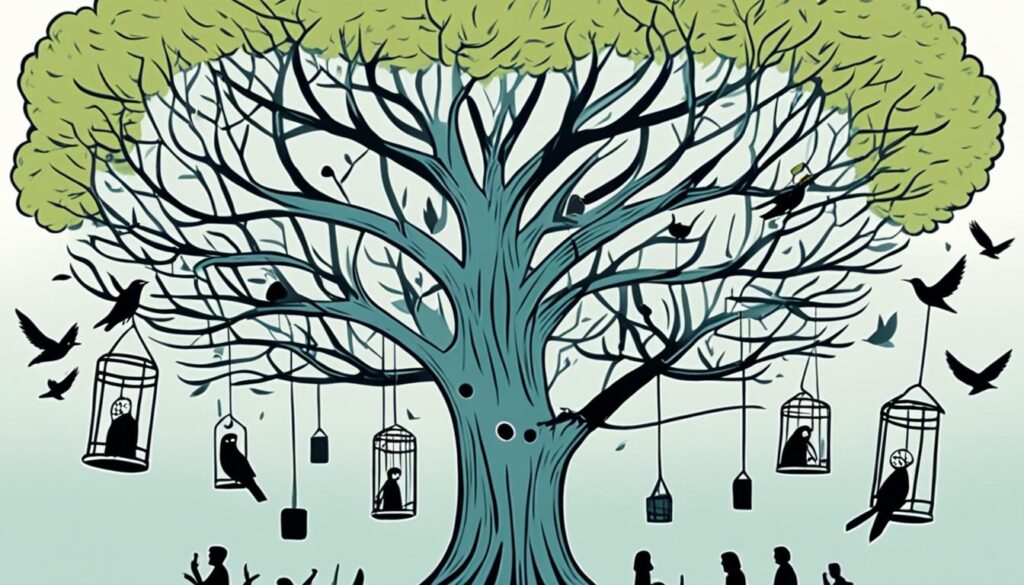Have you ever found yourself in a relationship with an introvert where your partner’s controlling behavior leaves you feeling trapped and manipulated? Dealing with a controlling introvert can be challenging, especially when their domination starts to affect your happiness and well-being.
Setting boundaries and managing controlling behavior are essential for maintaining a healthy relationship and protecting your own interests. But how do you navigate this complex dynamic and avoid being used?
We will explore nine effective strategies for dealing with a controlling introvert. From communication tips to maintaining independence, we will provide practical advice to help you regain control of your life and establish a healthier balance within your relationship.
So, if you’re ready to learn how to handle a controlling introvert and protect your own happiness, keep reading!
Key Takeaways:
- Setting boundaries and managing controlling behavior are crucial for maintaining a healthy relationship with a controlling introvert.
- Clear communication and assertiveness are key to establishing and enforcing boundaries.
- Don’t sacrifice your own needs and well-being to avoid conflict.
- Having separate financial independence is important in dealing with a controlling introvert.
- Maintaining independent friendships and activities is crucial for your emotional well-being.
Set Clear Boundaries and Expectations Early On
When dealing with a controlling introvert, it is crucial to set clear boundaries and expectations right from the start. By establishing these guidelines early on, you can minimize the chances of being manipulated or taken advantage of.
Healthy and assertive communication plays a significant role in maintaining these boundaries. It is essential to express your needs, desires, and limits openly and honestly, ensuring that your voice is heard and respected.
To effectively communicate with a controlling introvert, consider the following strategies:
- Use “I” statements to express your thoughts and feelings without blaming or attacking.
- Focus on specific behaviors that concern you, rather than making generalizations or assumptions.
- Remain calm and composed during conversations, even if the controlling introvert becomes defensive or tries to provoke a reaction.
Enforcing boundaries and expectations requires consistency and determination. Be firm in your stance, and do not waver or compromise on what is important to you. Stand your ground and assertively communicate your boundaries whenever necessary.
By setting clear boundaries and expectations early on, you can establish a foundation of mutual respect and understanding in your relationship. This approach encourages open and honest communication, fostering a healthier and more fulfilling connection.
| Benefits of Setting Clear Boundaries and Expectations |
|---|
| 1. Ensures that your needs and desires are acknowledged and respected. |
| 2. Helps prevent manipulation and control from the introverted party. |
| 3. Promotes a healthier and more balanced dynamic in the relationship. |
| 4. Creates a sense of security and trust in the partnership. |
Don’t Sacrifice Your Needs to Avoid Conflict
In a relationship with a controlling introvert, it may be tempting to sacrifice your own needs to avoid conflict. However, it’s important to prioritize self-care and fulfillment in order to maintain a healthy and balanced relationship.
By neglecting your own needs, you risk becoming resentful or disengaged, which can ultimately lead to the deterioration of the relationship. Instead, consider the following tips to prioritize your self-care:
- 1. Identify your needs: Take the time to reflect on your own desires, goals, and aspirations. Understand what makes you feel happy and fulfilled.
- 2. Communicate your needs: Share your needs with your partner in a calm and assertive manner. Effective communication can help ensure that your needs are acknowledged and respected.
- 3. Set boundaries: Establish clear boundaries that protect your personal well-being and prevent your needs from being compromised. Communicate these boundaries to your partner and stick to them.
- 4. Practice self-care: Make time for activities that bring you joy and help you recharge. This could include hobbies, exercise, spending time with friends, or engaging in self-care practices such as meditation or journaling.
- 5. Seek support: Surround yourself with a support network of friends and family who can provide guidance, encouragement, and a listening ear. Consider seeking professional help, such as therapy or counseling, to gain additional tools for managing control issues.
Remember, prioritizing your needs is not selfish; it is crucial for maintaining a healthy relationship. By taking care of yourself and setting boundaries, you can navigate conflicts while still respecting your own well-being and maintaining a healthy balance.
“It’s important to prioritize your own needs and well-being in a relationship. Taking care of yourself allows you to show up as a more fulfilled and balanced partner.”

| Benefits of Prioritizing Self-Care |
|---|
| 1. Increased personal happiness and fulfillment. |
| 2. Improved emotional well-being and reduced stress levels. |
| 3. Enhanced ability to navigate conflicts and maintain personal boundaries. |
| 4. Strengthened sense of self and autonomy. |
| 5. Promotion of a healthier and more balanced relationship dynamic. |
Have Separate Financial Independence
Having separate financial independence is crucial when dealing with a controlling introvert in a relationship. It is essential to avoid relying solely on the controlling introvert for financial support. This financial independence allows for equal decision-making power and ensures that both partners have control over their finances.
One potential pitfall of relying on the controlling introvert for financial support is that it can create an imbalance of power in the relationship. When one partner controls the finances, they may also exert control in other aspects of the relationship, leading to feelings of dependence and manipulation.
To establish financial autonomy, it is important to have open and honest discussions about money. Create a budget together and allocate individual financial responsibilities. This way, both partners contribute and have a say in financial decisions.
| Examples of Financial Boundaries | Benefits of Financial Independence |
|---|---|
|
|
By setting and maintaining financial boundaries, individuals can assert their independence and alleviate the potential control issues that may arise in the relationship. Having separate financial independence not only promotes a healthier dynamic but also ensures that each partner has the freedom to make their own financial choices.
Maintain Independent Friendships and Activities
When dealing with a controlling introvert, it is essential to maintain independent friendships and engage in individual activities. These outside connections can offer valuable support, perspective, and a sense of belonging outside the presence of the controlling individual.
Maintaining independent friendships allows you to nurture relationships beyond the boundaries of your controlling introvert’s influence. These friendships provide a space for you to express yourself freely, engage in shared interests, and receive support from people who understand and respect your boundaries.
Establishing and maintaining these individual interests and social connections is crucial. Here are some ways to cultivate and safeguard your independent friendships:
- Make time for regular social activities with friends, such as attending events, participating in hobbies, or going on trips together.
- Communicate openly with your friends about the challenges you face with the controlling introvert, seeking their understanding and advice.
- Maintain regular communication and check-ins, even when your controlling introvert may try to limit your interactions.
- Consider joining clubs or organizations related to your interests to meet like-minded individuals who share your passions.
Addressing the controlling tactics that may try to limit your independent friendships can be challenging but necessary for maintaining your autonomy. Here are some insights on how to handle controlling tactics:
- Clearly communicate your need for independence and personal connections, expressing the benefits these friendships bring to your overall well-being.
- Assertively set boundaries with your controlling introvert, insisting on the importance of maintaining your own individuality and social life.
- Remain firm and consistent in your position, reinforcing that these friendships are essential to your happiness and emotional fulfillment.
Maintaining independent friendships and engaging in individual activities has many benefits when dealing with a controlling introvert. These include:
“Having a strong support network of independent friendships allows you to find solace, encouragement, and a sense of self outside the influence of a controlling introvert. These connections provide a healthy outlet for self-expression and help foster personal growth and happiness.”
By maintaining independent friendships and activities, you can protect your individuality, emotional well-being, and overall happiness when facing the challenges posed by a controlling introvert.

| Benefits | Description |
|---|---|
| Emotional Support | Independent friendships provide emotional support, understanding, and empathy, helping you navigate the challenges of dealing with a controlling introvert. |
| Personal Growth | Engaging in individual activities fosters personal growth, enabling you to explore your passions, talents, and interests beyond the influence of a controlling introvert. |
| Happiness and Fulfillment | Maintaining independent friendships and participating in individual activities contribute to your overall happiness and fulfillment, promoting a healthy balance between your own needs and those of the controlling introvert. |
| Wider Perspective | Independent friendships offer a broader perspective, allowing you to gain insights, advice, and alternative viewpoints outside the controlling introvert’s influence. |
Seek Counseling if Behavior Escalates
If you find yourself struggling to cope with a controlling introvert and the situation is becoming increasingly difficult, it may be beneficial to seek professional counseling. Counseling can provide valuable guidance and support to help you navigate the complexities of dealing with a controlling introvert.
A trained therapist can help you understand the dynamics of the relationship and offer strategies for effectively managing the situation. They can provide you with coping mechanisms and tools to handle introvert domination and ensure your well-being is protected.
When seeking counseling, it is important to find a qualified counselor who has experience in dealing with controlling behavior. Look for someone who specializes in relationship dynamics and has a deep understanding of the challenges faced when coping with a controlling introvert. They can provide you with the personalized support and guidance you need to regain control and establish healthier boundaries.
By seeking counseling, you can gain a better understanding of your own needs and emotions, develop strategies for communication and problem-solving, and ultimately regain a sense of empowerment when dealing with a controlling introvert. Remember, your well-being is important, and seeking professional help is a proactive step towards reclaiming control of your own life.
Benefits of Seeking Counseling for Individuals Dealing with a Controlling Introvert
- Gain valuable guidance and support from a trained professional
- Develop a deeper understanding of the relationship dynamics
- Learn effective strategies for communication and problem-solving
- Regain a sense of empowerment and control
- Evaluate and prioritize your own needs and emotions
- Establish healthier boundaries in the relationship
| Strategies for Seeking Counseling | Choosing the Right Counselor |
|---|---|
| Research counseling options in your area | Look for counselors experienced in dealing with controlling behavior |
| Read reviews and gather recommendations | Check their credentials and areas of expertise |
| Reach out for an initial consultation or assessment | Ensure a good personal fit and rapport |
| Discuss your goals and concerns with the counselor | Feel comfortable and supported during sessions |
Address Controlling Tactics Respectfully But Firmly
In a relationship with a controlling introvert, it is crucial to address their controlling tactics in a respectful yet firm manner. Effective communication is key to challenging or confronting these behaviors and establishing healthy boundaries.
When addressing controlling tactics, keep in mind the following strategies:
- Use “I” statements to express your feelings and needs without blaming or accusing the controlling introvert. For example, say “I feel overwhelmed when you make all the decisions without considering my input” instead of “You always control everything.”
- Be assertive and confident in expressing your boundaries. Clearly communicate what behaviors are unacceptable to you and why. Reinforce these boundaries consistently.
- Seek compromise and find mutually acceptable solutions. Encourage open and honest dialogue to understand each other’s perspectives and work towards a middle ground.
- Avoid responding to controlling tactics with defensiveness or aggression. Stay calm, composed, and respectful, while assertively expressing your point of view.

Remember, addressing controlling tactics respectfully but firmly has several benefits:
“When I started assertively addressing my partner’s controlling behavior, it opened up opportunities for healthier communication and greater mutual understanding. We were able to build a stronger relationship based on respect and equality.”
| Benefits of Addressing Controlling Tactics Respectfully But Firmly |
|---|
| 1. Establishes clear boundaries |
| 2. Promotes open and honest communication |
| 3. Fosters mutual respect and understanding |
| 4. Allows for compromise and resolution |
| 5. Builds a healthier and more balanced relationship |
Don’t Jade, Argue, or React Emotionally
When dealing with a controlling introvert, it’s important to avoid engaging in unconstructive behaviors such as justifying, arguing, or reacting emotionally. These behaviors can escalate conflicts and hinder effective communication. Instead, focus on maintaining emotional stability and self-control to navigate challenging situations.
To stay grounded and centered, consider the following tips:
- Take deep breaths to calm yourself before responding.
- Pause and reflect before reacting impulsively.
- Practice active listening to understand the other person’s perspective.
- Keep the conversation focused on the issues at hand, avoiding personal attacks.
It’s also essential to have strategies for managing any resentments or frustrations that may arise. Here are a few approaches to consider:
- Seek healthy outlets for your emotions, such as venting to a trusted friend or journaling.
- Practice self-care activities that promote relaxation and rejuvenation.
- Engage in hobbies or activities that help you recharge and regain a positive mindset.
- Consider seeking professional counseling or therapy to process and address any lingering negative emotions.
By maintaining emotional stability and self-control, you can effectively navigate the dynamics of a relationship with a controlling introvert. This mindset allows for assertive communication and the preservation of personal boundaries, promoting healthier interactions and minimizing potential conflicts.
Be Willing to Walk Away if Disrespected
When dealing with a controlling introvert, it is crucial to prioritize your personal boundaries and overall well-being. If you find yourself repeatedly disrespected within the relationship, it is essential to be willing to walk away.

Recognizing and responding to disrespectful behaviors is key in asserting your boundaries. These behaviors may include constant criticism, belittling, or consistently disregarding your opinions and needs. By acknowledging these patterns of disrespect, you can take the necessary steps to protect yourself.
To handle introvert disrespect assertively:
- Communicate your feelings calmly and honestly, expressing how the disrespect affects you.
- Set clear boundaries regarding what behavior is unacceptable.
- Remain firm in upholding those boundaries.
It is important to remember that recognizing and asserting your boundaries is not manipulative or controlling; it is a fundamental aspect of maintaining a healthy relationship.
By being willing to walk away from a relationship where disrespect is prevalent, you are prioritizing your self-respect and well-being. You deserve to be in a relationship that values and respects you.
Put Your Well-being First When Issues Arise
In a relationship with a controlling introvert, it is crucial to prioritize your personal well-being when dealing with issues that may arise. Taking care of your emotional and mental health is essential for maintaining a healthy relationship and your own happiness.
Start by prioritizing self-care and self-reflection. Set aside time for activities that bring you joy, whether it’s reading a book, going for a walk, or practicing yoga. Taking care of yourself allows you to replenish your energy and maintain a positive mindset.
Don’t hesitate to seek support from trusted friends, family members, or professionals. Having a support network can provide you with guidance, advice, and perspective. Sometimes, talking to someone who understands your situation can help you navigate the challenges of dealing with a controlling introvert.
Lastly, develop strategies for maintaining a positive mindset. Practice gratitude and focus on the positive aspects of your life. Surround yourself with people who uplift you and engage in activities that inspire and motivate you. Remember, putting your well-being first is not selfish but necessary for your own happiness and the health of your relationship with a controlling introvert.
FAQ
How do I deal with a controlling introvert?
Dealing with a controlling introvert requires setting clear boundaries, maintaining open communication, and prioritizing your own needs. It’s important to assert yourself respectfully but firmly, seek counseling if necessary, and be willing to walk away if disrespected.
How can I set clear boundaries and expectations with a controlling introvert?
Setting clear boundaries and expectations early on in the relationship is crucial. Communicate assertively, enforce your boundaries, and prioritize your own needs. Healthy and open communication is key to maintaining these boundaries.
Should I sacrifice my needs to avoid conflict with a controlling introvert?
No, sacrificing your needs is not healthy for you or the relationship. Prioritize self-care and fulfillment, and learn to navigate conflicts while still respecting your personal boundaries. It’s important to maintain a balance between your needs and the needs of the relationship.
How can I establish separate financial independence in a relationship with a controlling introvert?
Having separate financial independence is crucial in a relationship with a controlling introvert. Establish your own financial autonomy, ensure equal decision-making power, and discuss and set boundaries regarding finances. This will help maintain a healthier dynamic in the relationship.
What can I do to maintain independent friendships and activities while dealing with a controlling introvert?
Maintaining independent friendships and engaging in individual activities is important for your well-being. Establish and maintain these individual interests and social connections, and address any controlling tactics that may try to limit them. These outside connections can offer support and perspective.
When should I consider seeking counseling for dealing with a controlling introvert?
If the controlling behavior escalates or becomes too difficult to handle, it may be beneficial to seek professional counseling. A trained therapist can provide guidance and support, helping you navigate the dynamics of the relationship and establish healthier communication patterns.
How should I address controlling tactics in a relationship with a controlling introvert?
Addressing controlling tactics requires respectful yet firm communication. Challenge or confront these behaviors using effective communication strategies, and establish healthy communication patterns. By addressing these tactics, you can maintain your personal boundaries and promote a healthier relationship.
What should I do to maintain emotional stability when dealing with a controlling introvert?
It’s important to avoid engaging in unconstructive behaviors such as justifying, arguing, or reacting emotionally. Instead, stay grounded and centered in challenging situations, manage any resentment or frustration that may arise, and maintain emotional stability and self-control. This will help you navigate the relationship more effectively.
Should I be willing to walk away if I’m disrespected by a controlling introvert?
Yes, it is important to protect your personal boundaries and well-being. If disrespect becomes a recurring issue in the relationship and your boundaries are consistently disregarded, be willing to walk away. It’s crucial to prioritize your own self-respect and seek healthier relationships.
How can I put my well-being first when dealing with issues in a relationship with a controlling introvert?
In dealing with issues, it’s important to prioritize your personal well-being. Practice self-care and self-reflection, seek support from trusted friends, family, or professionals, and maintain a positive mindset. By putting your well-being first, you can better navigate the challenges of a relationship with a controlling introvert.